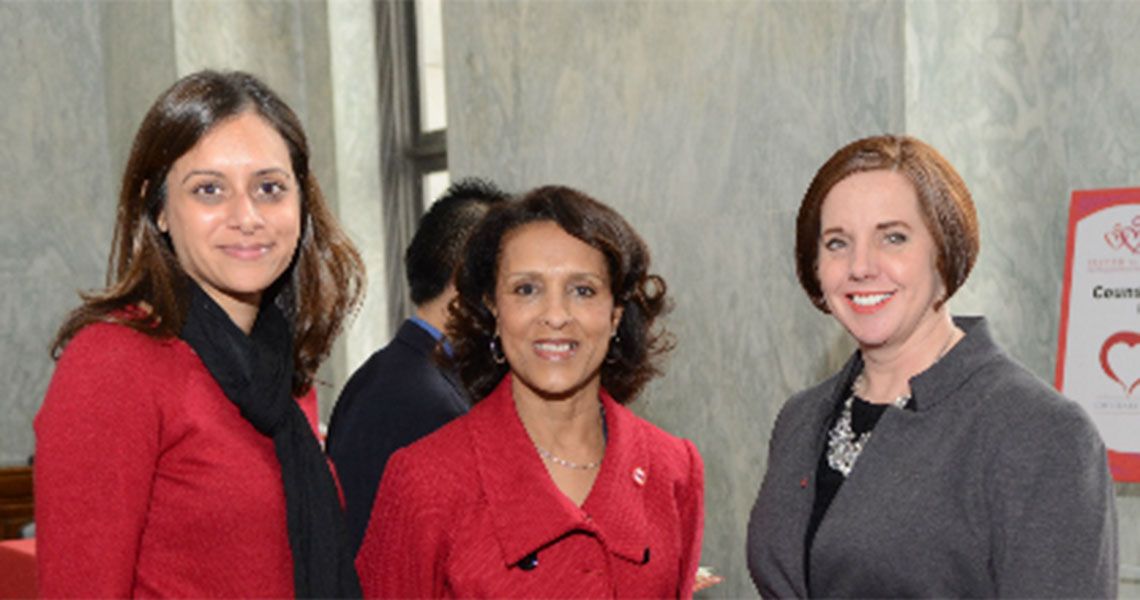Heart disease is the leading killer of women in the United States, according to the Centers for Disease Control and Prevention. One in every four women who dies each year succumbs to heart disease. In honor of February’s National Heart Month, Sister to Sister, a nonprofit foundation dedicated to preventing heart disease in women, hosts its annual Cardiovascular Disease Prevention Program on Capitol Hill. The event offers free heart screenings and heart-healthy education to legislators and their staff members. This year, Jannet F. Lewis M.D., director of GW Hospital’s Women’s Heart Center, and professor of medicine at the GW School of Medicine and Health Sciences, served as the cardiac care expert for the screening event. She answered questions regarding heart disease prevention, how to recognize risk factors, and offered tips for leading a healthy lifestyle. For Lewis, events like this are so important because they help identify people who are risk for heart disease.
For years, people have thought of heart disease solely as a men’s health issue, but Lewis stressed the fact that heart disease kills more women annually than breast and lung cancer combined. It’s all about knowing your risk factors. High blood pressure and high cholesterol, smoking, obesity, and diabetes are all factors that can contribute to heart disease. By modifying one’s lifestyle a woman can significantly reduce her risk of developing the disease.
Getting your results immediately was a feature of the event that was greatly appreciated by the nearly 100 members of Congress who stopped by to learn about their heart health. For Susan K. Gurley, executive director of the Sister to Sister Foundation, it’s what makes the Sister to Sister Foundation and this event so unique. “You get screened here, you get your results here, and you get the chance to meet medical professionals that can actually put together a personalized heart-health plan for you,” she said. Since 2002, the foundation has screened more than 3,000 members of Congress, their staff, and employees for heart disease.
“I wanted to know if there were any problems, as well as what I can do to prevent myself from developing heart disease later in life,” said Brenna Hanson, legislative correspondent for Representative Ann Kirkpatrick, D-AZ1. Because her work environment is often stressful, Hanson wanted to know what she could do to prevent or reverse any health issues stemming from lifestyle-related issues such as poor eating habits, lack of sleep, or not enough exercise.
Lewis, along with Kelli Metzger, MS, RD, dietitian at the GW Medical Faculty Associates (MFA), and Helma Parikh, CRNP, nurse practitioner, division of cardiology at the MFA, were on hand to answer questions regarding heart disease detection and prevention. In addition to getting screened, legislators were treated to massages with aromatherapy and demonstrations by a personal fitness trainer who showed policymakers how they can do yoga at their desk.
As a legislative assistant for Representative Tom Rice R-SC6, Tara O’Neill is always on the go. “My job can be very stressful, so it was important for me to get checked and make sure I’m healthy,” she said.
Taking control of your heart health starts with being informed and making the appropriate modifications to your lifestyle, but most importantly it starts by getting screened. For O’Neill that was certainly the case. “I have never had my cholesterol checked before today,” she said. “I think this event is great because it’s free, convenient, and if I can squeeze in a massage to help me relax a little after a stressful work week, all the better.”



